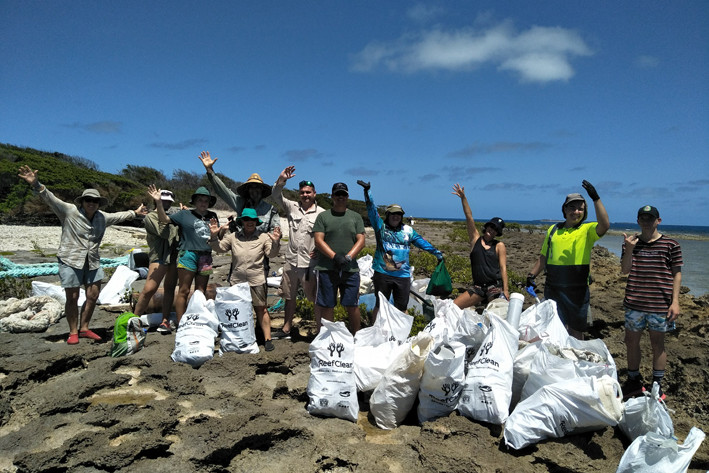General News
23 December, 2020
260 bags of trash removed from islands
IN late November, the Tangaroa Blue Foundation and Wavelength Reef Cruises set off on an expedition to clean-up several islands that lie in the Northern Great Barrier Reef Region as part of the ReefClean project.

Despite the fact that these areas are so remote, the crew of volunteers picked up 1.8 tonnes and 260 bags of marine debris during their short visit.
The Tangaroa Blue volunteers were joined by a group of students and teachers from Endeavour Christian College who were heading out to Jiigurru (Lizard Island) for a marine research camp.
Despite the rough winds and seas, the crew were able to remove one tonne of marine debris off Two Islands National Park, Nymph Island, Palfrey Island, Eagle Island, Rocky Isles, South Direction Island and one of the islands in the Turtle Group.
The calmer weather on the return trip to Cooktown also allowed a visit to Low Wooded Island, where in just three hours the team picked up 760kg of debris, just off the South-East facing beach.
Most of the debris had been sitting in the sun for so long that it disintegrated when handled.
Amongst the debris found on this trip were over 6,800 broken hard bits of plastic, 1,180 plastic lids and bottle tops, 700 plastic drink bottles, 620, thongs and rubber soles, 540 insulation and packaging foam remnants, 360 rope and net scraps and 135 personal care bottles.
Some of the largest and heaviest items included over 940m of rope, 60 square metres of netting, and large commercial fishing remnants such as Fish Attracting Devices (FADs) and longline tracking beacons.
It is important to remove marine debris from the environment as it injures wildlife, destroys habitat and continues to break up into microplastics which become an even larger issue down the line.
However, Tangaroa Blue’s motto is “If all we do is clean-up, that’s all we’ll ever do,” and this harsh reality is the reason why the organisation has a large focus on collecting data on what they find.
The debris collected on clean-ups is sorted and entered into over 140 different categories and recorded in the Australian marine Debris Initiative (AMDI) Database.
Some of the information collected is very detailed, including the barcodes and brands of foreign items, and the colour, size and markings on plastic strapping bands.
This information can then be used to trace the debris back to the source as much as possible and stop it from entering our oceans in the first place through the implementation of source reduction plans.
Since 2004, over 17 million items have been entered into the AMDI Database.
Tangaroa Blue strongly encourages anyone that picks up debris around the country to download the AMDI App for free and contribute to this huge citizen science project to protect our oceans.
For those interested in coming along to clean-up events such as this one, check out the Tangaroa Blue website (www.tangaroablue.org) for more information.
ReefClean is a project funded by the Australian Government’s Reef Trust and delivered by the Tangaroa Blue Foundation.


